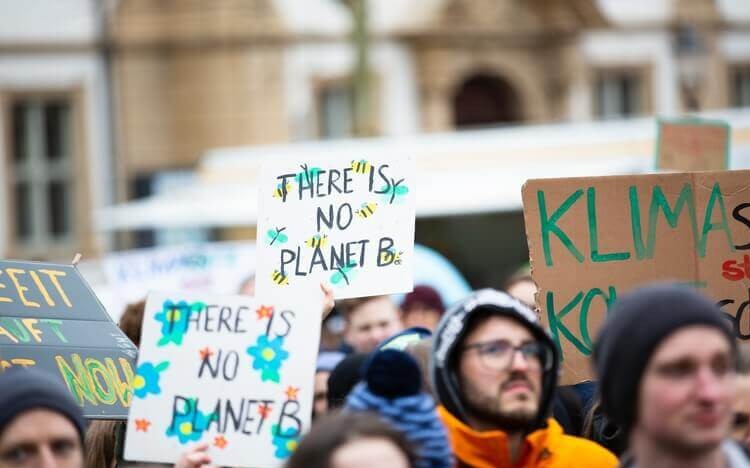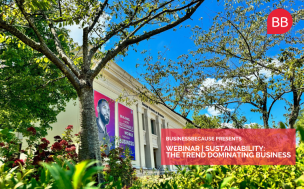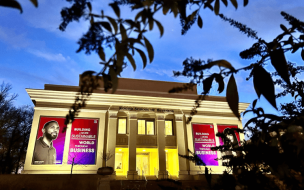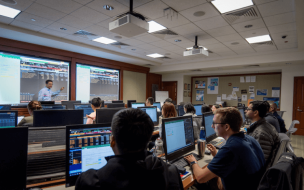Students in the MS in sustainable management at Kogod School of Business are learning how to use their careers for good
The surface temperature on planet Earth has risen about 1.62 degrees Fahrenheit since the end of the 19th century, a rise that has brought with it a proliferation of extreme weather events across the world.This January, Chicago was hit with a polar vortex that saw temperatures drop below -50 degrees Fahrenheit; in 2017, a series of hurricanes devastated many areas across the Atlantic, including US territory Puerto Rico.
For many, these kinds of extreme events are a sign of things to come, and a galvanizing force to use their careers to tackle climate change.
Through the MS in sustainable management (MSSM) program at American University’s , these people get the tools to put their ambitions into action.
Learning close to the center of policy

Ed Carley, a 2015 graduate of the program, is one such person. Though he’d had a lifelong interest in sustainability, it was global warming’s impact on his local community in the mountains of Colorado that triggered his decision to join the master’s program.
“High elevations are being impacted first by climate change, and that was apparent where I live,” Ed explains. “We had low-snow winters in the high Rockies of Colorado and wildfires and drought years [in the summers]—there were years when my whole valley would smell like a campfire.”
When he started researching sustainability master’s programs, soon rose to the top of his list.
American University was the first university in the US to become totally carbon-neutral, which it achieved in 2017, two years ahead of its original schedule, and the school’s location in Washington, DC allows students in the program to see climate change decisions happening in real time, particularly in the arena of policy.
“The location in DC made a lot of sense,” says Ed. “The renewable energy business at the time was so driven by policy—it’s now shifted to be driven by cost, as wind and solar are cheaper than everything else—but the program has a good mix of business and policy [exposure].”
Since his graduation, Ed has moved into a policy-centered role as part of the National Association of State Energy Officials, where he now works across all 50 states and the 6 US territories, advising authorities on how to maximize energy efficiency in built environments.
“Sustainability is a very broad field”
However, Ed cautions others against thinking that the only impactful role you can have in sustainability is in government.
“I occasionally talk to individuals who are interested in also breaking into the sustainability world,” he says, “and I have typically encouraged them to define what sustainability means to them and what that should mean for their career.
“It can mean anything from how to green a supply chain, to energy efficiency, to helping a corporation do their communications around sustainability—it’s a very broad field.”
Indeed, there are ample opportunities outside of the government, such as in businesses and charities, for students to make a positive impact on the environment.

Josh Kaplan, another graduate of the MSSM program, had always nurtured dreams of changing the world, and he had even studied environmental science at American University as an undergraduate. However, he felt that the thing he was lacking was a business education.
“When you need to go and have a conversation with your CFO, for instance, being able to speak the same language as the finance team, as the accountants, procurement, [etc.] is really important,” he explains. “The opportunity to do a degree that included those topics and provided that background in organizational management was very valuable.”
Particularly handy was the ability for any MSSM student to take classes and lectures at other schools and departments within the university, such as the School of Public Affairs.
This interdisciplinary education has served Josh well, and he is now a senior associate at the Renewable Energy Buyers Alliance, having spent two and a half years as a program officer for renewable energy and climate at the World Wildlife Fund.
Evidently, the career paths available to those who want to make a difference are many and varied. As far as Josh is concerned, he hopes his path will lead him ultimately to a director of sustainability role, optimizing energy efficiency at a top company.

Maria Figueroa-Armijos, the director of the MSSM program, says that this kind of progression is to be expected as sustainability becomes more of a global business priority—and that ultimately, students in the MSSM program at the are best-placed to profit.
“Our goal is to prepare students to be at the forefront of corporate sustainability,” she explains. “By exposing them to the latest innovations and the latest knowledge available across the area of sustainability, I believe that we are giving them a toolbox of skills, of frameworks, of exposure, that they can take with them wherever they go.”
Student Reviews
Kogod School of Business - American University
Clean and well maintained campus
I am completely enamored with this school. The entire student body is driven, inclusive, and highly intelligent. The decision to attend American University is not made haphazardly. Its close proximity to Washington DC, making it one of the most strategically located schools after Georgetown, means it's just a short train ride away. The campus is well-maintained, with mostly attractive buildings, although there are a few that are less appealing. Additionally, there are numerous excellent food options available. The wide range of clubs and organizations to join is remarkable. It is undeniably a school filled with immense passion.
City life
I’m having a wonderful time at American University. I love that I can get to a big city and still feel like a traditional campus. Sincerely, it is a school that may require some adjusting to, but in the end, it is a very good school with numerous opportunities for its students. The atmosphere in AU is so great that it pushes you in a positive way and offers every opportunity you could want.
Amazing helpful professors
American College is an incredible school with astounding teachers. Best professors I could have asked for at an amazing school. My opinion is that American University's professors are its greatest asset. They are extremely intelligent and always eager to assist their students. They go above and beyond in their classes to make sure that their students do their best.
AU Review
The workload is quite high and AU is definitely not an "easy" school. Students take their studies very seriously and can almost always find a group in the library, DAV, Starbucks or MGC. Courses can be quite ambitious if the right courses are offered and the admissions process can be confusing at times, but with the help of an advisor it is quite easy to navigate. The library can be crowded, and while it's not huge, there are plenty of other places to study on campus. The professors really want to help during office hours and interact with students. I've had good experiences with the professors and workload at AU, but it's an expensive city.
Majoring in Political and International Relations
The instructors are unique and the classes can be boring at times. Check-in is stressful (but it is everywhere). The workload is what I expected. The most popular majors are international relations and political science
I Love Being A Musical Theater Major
I love being a musical theater student, if you want to help behind the scenes, if you want to be an assistant director, if you want to be a director, if you want to write, you can do anything at this academy, very supportive, it's amazing, they are always there to help you. This is their working time. Even after the audition tells you what you did wrong, you can do better, or if you get picked, you know why they picked you, which is great
AU's Business Model
Overall, there were a lot of good opportunities at UA, both in terms of course range and faculty. However, I had a few complete misfires. People who shouldn't have taught at all. Like all universities, AU's business model is to hire hands-on assistants so they don't have to pay them extra or perform well. They are signed and if that does not work, they are not hired any more. The problem with this is that you end up with people who are unqualified and bring their own agendas, biases that may or may not be based on research. Most of the professors were absolutely fantastic.
AU - The Real Problem With Academics
Some teachers are amazing, some awful - typical of any school. But the real problem with AU is that many students don't care about academics as much as other things (eg, partying). The academics are really interrupted by the Greek life and the social life of the students. This makes it difficult for students interested in academics to get the most out of their school experience. Some students do not take classes seriously and do not respect teachers and other students. Courses and opportunities at UA are perfect for people who want to take advantage
American University - The Best Place to Study
They know their stuff - I chose American University because the campus is beautiful and the biology program is relatively small. But after the first semester, I realized that all the professors, especially the people in the science department, are experts in their field. They are enthusiastic and helpful in lecturing; even the TAs who teach the labs are amazing and engaging.
Engaging Students and Incredible Professors
I would 100% recommend this school. I am a Marine Corps Veteran and proud AU alum. NI received my BA in Comparative Politics at AU in 2017. It was engaging and worth every minute. I was constantly engaged with the material the material and was fascinated by the culture the school presented. As an older student I was nervous to go to a highly competitive college but with the culture of both student and staff it was enjoyable through and through.











